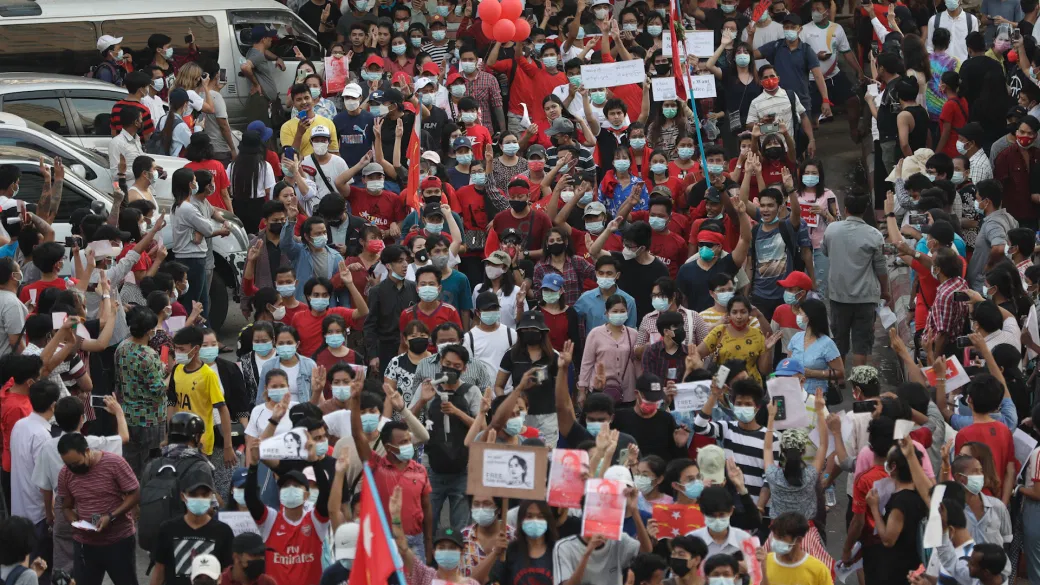Other Pages
- Opinion Poll
- About Us
- Send Your Story
- Contact Us
- Newsletter
- Privacy Policy
- Terms and Conditions

On Tuesday night, soldiers raided and ransacked the headquarters of the party of the detained leader, Aung San Suu Kyi. This was coming after police shot water cannons, tear gas and rubber bullets in a sudden escalation of force against the protests sweeping the country.
According to a doctor in Naypyidaw, the military also used live rounds that left two people critically injured. However, footage showed protesters in the capital were undeterred, returning to a blockade on a major highway on Wednesday morning.
The United Nations special rapporteur, Tom Andrews condemned the use of force, adding that the police had injured a young woman, whose images have spread like wildfire online, accompanied with expressions of griefs and fury.
The envoy wrote on Wednesday, “They can shoot a young woman but they can’t steal the hope & resolve of a determined people,” noting that “The world stands in solidarity with the protesters of Myanmar.”
The international condemnation of the takeover was led by the United States, the US on Tuesday renewed its call for freedom of expression in Myanmar, asking the generals to step down.
“We repeat our calls for the military to relinquish power, restore democratically elected government (and) release those detained,” State Department spokesman Ned Price told reporters.
In Mandalay, Myanmar’s cultural capital and its seat of pre-colonial monarchy, eyewitnesses saw security forces firing tear gas directly at protesters waving the red flag of the Suu Kyi’s party, National League of Democracy (NLD).
State media had claimed that the protesters had used “obscene language” and thrown objects at police where four officers were injured. It said this in its first direct mention of the street protests since it began on the weekend.
“Therefore, the police members dispersed in accordance with the methods and laws,” the state-owned Global News Light of Myanmar newspaper reported, without mentioning other police confrontations elsewhere in the country.
READ ALSO: Aung San Suu Kyi: 'We Don't Feel Sorry For Her', Say Rohingya Refugees
On Wednesday morning, hundreds of protesters returned to the streets of Yangon, a day before, a large crowd of protesters faced off against water cannon and a phalanx of riot police near Suu Kyi’s residence.
Though there were no reported clashes with authorities at the commercial hub on Tuesday, university student, Khin Nyein Wai said she was still afraid.
“I still came out as I do not like the military dictatorship,” she told AFP. “This is for our future.”
The military had justified the coup of last week, claiming widespread voter fraud in the November polls, which saw a landslide for Suu Kyi and her party.
In a quick move, the military stack courts and political offices with loyalists.
Since army chief Min Aung Hlaing ousted the Nobel Laureate from power 10 days ago, ending a decate of civilian rule, Myanmar has been roiled by an increasing civil disobedience campaign and massive street protests.
Medical staff, air traffic controllers and teachers have staged strikes, fronted for work while wearing red ribbons on their uniforms or posed for photos, brandishing the three-finger salute adopted by the anti-coup movement.
The protesters in the streets have called for the release of Suu Kyi, who have not appeared in public since she and other top political leaders were detained and for the generals to respect the result of the last election.
On Tuesday, gatherings were banned and a nighttime curfew was in effect in the biggest cities of Yangon, Mandalay and Naypyidaw, and many other towns.
The United Nations has expressed “strong concern” over Tuesday’s violence.
The UN resident coordinator in Myanmar, Ola Almgren said, “The use of disproportionate force against demonstrators is unacceptable.”
The foreign policy chief of the European Union, Josep Borrel, warned that the bloc could impose fresh sanctions on Myanmar’s military but said any measures should be focused so that the wider population would not be hit.
New Zealand is the first country to take action to isolate the junta on the same day after it announced the suspension of the high-level military and political contacts with Myanmar.
The UN Human Rights Council said a special session would be held on Friday to discuss the crisis.
0 Comment(s)